- Home
- Michael Wallace
The Sentinel (The Sentinel Trilogy Book 1) Page 5
The Sentinel (The Sentinel Trilogy Book 1) Read online
Page 5
“You claim to have given us Singaporean communication protocols,” Tolvern continued, “yet I’ve sent out a distress call and nobody has answered.”
“What do you expect me to do about that?” Djikstra said. “Go out in a scout ship and track them down, force them to answer?”
Capp spoke up near the door. “You could stop lying, how’s that for a start?”
“Look, if you don’t believe me, fine. Let me send a subspace to some friends, put me down on the nearest rock with supplies, and I’ll wait to be picked up.”
“Right, send out a subspace to your mates,” Capp said. “Bunch of pirates would come after us, is that your plan?”
“That’s ridiculous,” Djikstra said. “You think this is some elaborate trap?”
“Nobody is going to come looking for you out here,” Tolvern said. “Except maybe Apex when they intercept your subspace. And then they’ll eat you. Which you’re well aware of.”
“All the more reason your insinuations are ridiculous. What possible motive would I have for lying?”
There was little fire in his words, and Tolvern noted that the whole conversation had gone like that. The two officers were laying out their suspicions—Tolvern by pointing out discrepancies, and Capp more bluntly accusing the man of piracy—but while Djikstra was professing his innocence, he didn’t seem outraged, as he should be. If his story was true, he’d witnessed the horror of thousands of refugees being captured or killed by Apex, of his entire crew dying around him, so where was his anger? He looked a little pale, and word had it that he hadn’t slept since they’d picked him up. Tolvern would have guessed he was suffering from the flu, but the sick bay had pronounced him in full health.
“How many ships did you say were in the refugee fleet?” Tolvern asked.
“Seventy-eight. Three war junks converted to stasis transports, twelve frigate-sized craft with armaments of some kind, several strikers—those are Singaporean short-range fighters—but modified with warp point engines. A couple of Hroom merchant sloops with guns. The rest were purely commercial freighters and the like. Oh, and my flagship. Crew of fifty-six before they destroyed the oxygen plant and the rest suffocated.”
“That’s a big fleet to go down so completely, even if most of them were civilian vessels. How many refugees in total?”
“A little over sixty thousand, most of them in stasis. About three thousand men and women were serving as crew or armed to repel boarders. You know how the bird people like to take prisoners.”
Djikstra said all this in a clinical way. A bead of sweat worked down his temple, and the corner of his eye twitched. Then he wiped the sweat, and a little color came back to his face.
“I don’t know why you’re so suspicious,” he added. “I’m one man, and you’ve got my ship. If the Royal Navy means to use it, go ahead, but I expect to be paid standard rates.”
Capp snorted. “Wrecked-up piece of junk. Good for target practice, and that’s about it.”
“I’m regretting ever hauling it through the jump point,” Tolvern said, carefully studying the man’s face as she said it. “I’m cutting it loose. And you won’t get a tuppence for it, either.”
At last, outrage came over Djikstra’s face, though he didn’t spring to his feet as she’d expected. “Do you know how much I paid for that ship? For outfitting it? How much it cost me to make the trek out here?”
“Expecting big profits, no doubt,” Tolvern said. “Take all the silver you can from desperate people.”
“Don’t see the Royal Navy out here doing it,” Djikstra said. “Face it, Captain, nobody is going to risk the buzzards for free. You got your Ladinos and your New Dutch—the mercenary types—but they’ve got to be paid.”
That was true enough, and Tolvern wished the navy could help the Singaporeans fleeing the final destruction of their people. If only they weren’t fighting for their lives, they might have. Admiral Drake would have, that’s for sure.
But that didn’t mean she liked watching men like Djikstra pick over the corpse, taking only those with coin to buy their lives. Get to the other side and it was worse. There, they sold the survivors as indentured servants and collected double pay. Tolvern could feel sorry Djikstra’s crew was dead, recognize they were saving lives, and still loath the profit-seeking that had motivated them.
“Your objection is noted, and the loss of your ship will be logged.” Tolvern waved her hand. “Go back to your quarters, Djikstra, and pray we don’t put you back on board before we cut the tether.”
He rose and retreated from the war room. Tolvern and Capp followed him onto the bridge. Curious glances greeted them, including from Tolvern’s Hroom pilot. After the New Dutch captain had trudged across the bridge and taken the lift back to his quarters, Tolvern stood next to the captain’s chair, but didn’t sit down.
Capp came up beside her. “I don’t trust that bloke one bit.”
“He’s an odd one, all right. I wish I could figure him out.”
Tolvern glanced at the screen. An unblinking swath of stars ate up two-thirds of the view, with long-range scans of a copper colored gas giant on the other third. It was the sort of long haul through an uncharted system that made for boredom and impatience under normal circumstances, but with twin dangers of suffocation and detonation via failed plasma engine looming, every officer on the bridge looked tense.
“I was bluffing with that pirate rubbish,” Capp said. “Don’t figure we’d run into pirates way out here.”
“No, we won’t. But your comment made about as much sense as Djikstra’s suggestion we put him down to wait.”
“Aye, that was strange, all right.”
Tolvern wanted another opinion, and she settled on her pilot, Nyb Pim, who met her gaze with his enormous round eyes. He had the dark, almost bruised purple skin of a healthy Hroom, one unmarred by the sugar addiction that plagued his people and had brought the alien race to its knees.
“Can I have a word?” she asked him. “I could use the Hroom perspective.”
Nyb Pim unfolded himself from his chair like a giant mantis and followed the two women into the war room. Tolvern relayed her conversation with Djikstra, as well as her doubts.
“I am Hroom,” he said in his high, almost hooting voice. “We are notoriously poor at discerning subterfuge. If you say you doubt the story, I will accept your judgment.”
Capp rubbed her hand over her buzzed scalp. “You don’t suppose that Dutch bloke has thrown his lot in with the birds?”
“What human would do such a thing?” Tolvern said. “Anyway, Apex have no allies—not that we’ve seen. They aren’t slavers or plunderers, or even colonizers. They have no reason for this war that either human or Hroom would understand.”
“They’re bloody aliens,” Capp said with a shrug. “Who knows what they want? No offense, friend,” she added to Nyb Pim, “but you’re different. We all know the Hroom, don’t we? We can work with you people when we need to.”
“They are not so alien as to be beyond comprehension,” Nyb Pim said. “The birds are apex predators. When they sense weakness, they attack and exterminate. When they sense strength, they retreat until they are stronger.”
“It sounds so simple,” Tolvern said. “And repugnant.”
“So I was bluffing about Djikstra setting us up with the pirates,” Capp said, “and you was bluffing about dumping his ship. So what’re we gonna do?”
“I wasn’t bluffing,” Tolvern said. “We are ridding ourselves of his vessel. Going to give it a shove back toward the sun and let it burn.”
“Huh? Why?”
“I don’t think Djikstra is working with Apex—I can’t even imagine such a thing—but I don’t know about his ship. Think about it. It hits the jump point, and the injured crew all die except for the captain. I know we’ve scanned it and found nothing but a broken oxygen plant, but Apex is always on top of our communications. They seem to know where we’re going and who we’re talking to, and this sort of thing migh
t be how they do it. Give us a ship to haul along that’s bugged and sending out transmissions.”
Capp scowled. “Yeah, all right. We’ll ditch it. Don’t like it, though. We lost Swift, and I kept thinking we’d fix up Djikstra’s boat and use it as an escort, but you’re the captain.”
“It’s a battered piece of junk,” Tolvern said. “It would never serve as an escort, Lieutenant, not without a complete overhaul in the yards.”
“At least let me get Carvalho and the boys in there first, see what we can strip out.”
“And weld on a piece of armor that broadcasts our location to the enemy?” Tolvern asked. “No, we cut it all loose, get rid of everything, including whatever personal belongings Djikstra brought over with him. Hell, I want his body hair shaved and every orifice prodded for bugs while we’re at it.”
Capp grinned at this. “You gonna do the prodding, Cap’n? Been a while since you got any action.”
At one time Tolvern would have blushed at this sort of talk, or bristled at its inappropriateness. Now, she let it slide. Even hid a smile.
“When I get some action, Lieutenant, it’s not going to be with that walking cadaver. I’d sooner mate with a Hroom.” Tolvern glanced at Nyb Pim. “Sorry, Pilot.”
Nyb Pim merely stared back with his wide liquid gaze. “And a Hroom would sooner mate with you, Captain. Jan Djikstra would not be appealing to any species.”
Capp and Tolvern both stared for a long moment and then laughed.
“A joke!” Tolvern said. “I thought joking was beyond your ability.”
“Was it a joke? I was unaware.”
Capp slapped the tall alien on the back as she rose. “Aye, and a funny one, mate. For a Hroom.” She turned to the captain. “I’ll give the orders. Dump the Dutchman’s ship, toss his clothes in the incinerator. Shave his body and prod his orifices.”
Tolvern laughed again. “That last part was my joke.”
“King’s balls, it was? I thought you was being serious.” Capp cracked her knuckles. “I’d have done it, too. Put on a glove and shoved my hand—”
“Yes, we get the picture.”
“And then what, Cap’n?”
That was a good question. Tolvern had broadcast an audio message, bracketed by the Singaporean protocol Djikstra had given her. Supposedly, it would help her contact a military base in the system. According to Djikstra—and refugees had earlier made the same claims—when the Singaporean Imperium was still holding its own against Apex, they’d built a ring of heavily armed bases in choke points to protect the home world. Cloaked them, ordered them to maintain permanent vigil. Some of them remained undiscovered to this day.
If she could find it, Djikstra claimed, the Singaporeans had the capability to repair Blackbeard, get her back in the fight. Then Tolvern could reconnect with the fleet. Maybe even pick up some new tech and new tactics. Singapore’s brutal struggle had earned them valuable knowledge, and they’d also had five hundred years of independent development since the Great Migration. Who knew what secrets they could share?
“How does he know all that anyway?” Tolvern said.
Capp blinked. “Huh?”
“It’s a hidden base, but Djikstra knows it’s here. These bases are incommunicado—that’s why they’re still out there maintaining vigil. Why would the refugees tell a New Dutch pilot how to find one of them?
“Perhaps because there is no longer a good reason to remain hidden,” Nyb Pim said. “The war for the Singaporeans is effectively over, and there is nothing left to protect.”
“Then why not tell the bases themselves?” Tolvern said. “If Apex battered a path to the home world, whatever bases remain hidden are useless. Why not order them home to make a final stand, or at least let their crew evacuate with the refugees?”
“That’s right, Cap’n,” Capp said. “I never thought of that.”
“The only reason a base is still here is if it remains a secret,” Tolvern said. Her suspicions continued to bloom. “And there’s no way Djikstra would know where they were if that were the case. You know what I think? I think he made up the whole story. And we were so desperate to get patched up that we believed it.”
Capp rubbed her head again. “But why? If he ain’t a pirate, and he don’t care for helping Apex . . . why lie?”
Tolvern’s com link pinged with a high priority message, and she opened a channel. It was Smythe, the ship’s tech officer, calling from the bridge.
“You’d better come out here, Captain,” Smythe said. “That signal we’ve been sending out? We just got an answer.”
Chapter Five
“Who else has heard this?” Li asked. His heart was thumping.
“Nobody, Commander,” Swettenham said.
Li poised his hand above the console, ready to play it again. Better still, to hurry back to his quarters and listen to it in private. To listen to it again and again. Eleven years, and everything he knew—or thought he knew—upended in 137 seconds of audio. It shocked him, and now that he’d heard it, he wanted to listen again, to hear the words of that strange dialect translated by the computer, the contact with outsiders. With the unknown. With their salvation.
Careful, Li. You’ll turn into an Opener. And you can’t afford that. Not now.
“Shall I play it again, sir?”
“Yes,” Li said carefully, betraying no emotion. “No, hold on. Nobody? Not even Hillary Koh?”
“No, sir. She provided the code, and heard a few snippets, but the computer was churning away to get the whole text, and Koh is off shift now. Probably asleep.”
“What snippets, exactly?”
Li couldn’t help but glance over his shoulder as he asked this, though nobody would have possibly followed them into the uncontrolled climate here in the bowels of the water processing system.
Curving pipes crowded the tight corridor, twisting this way and that like the intestines of a star leviathan. A constant hum filled the air: the sound of water in pipes, the occasional knocking from cavitation as pressurized fluid passed through improperly calibrated valves. The heat and humidity made Swettenham’s glasses slip down.
He pushed them back up and peered myopically at Li. “Why, sir?”
“Answer the question, Swettenham. What exactly did Koh hear?”
“Sorry, sir. I was just wondering what you’re afraid of. Um, let me see. The salutation only. We deciphered that first. Then Koh went off shift, and I kept on without her. That was a few hours ago.”
“A strange time to take a break. Right when you’re about to get a message from an unknown civilization.”
“We’d been working almost two days straight,” Swettenham said. “Anyway, she had it cracked—the code was working. Sir, what exactly are you afraid of?”
“Of factionalism, of course. I need time to process this before the Openers and the Sentry Faction start fighting over it.”
“What is there to fight about? This settles matters. You’re answering, of course. Right, sir?”
“Dammit, Swettenham. I’m losing my patience. Your job was to translate, not second-guess me, and not to grill me like you’re my superior.”
Li paused as a particularly loud gush of water flowed through the large green pipe on which they stood. The unmistakable odor of methane briefly colored the air before the filters carried it away. Missized valves, leaky seals, and knocking pipes—sooner or later they’d need actual repair and replacement.
“Sorry, sir. Shall I play the message again?” Too much eagerness in Swettenham’s voice.
“Yes, one more time.”
The engineer touched a button on his console, and the translation came directly into Li’s ear through the com link. Swettenham, listening to the same message, widened his eyes. His mouth hung open slightly and he breathed deeply, like a man hearing the chime of bells in an ancient temple, and not a rough translation as spoken through a cool, neutral computer voice.
Open transmission
Greetings, Singaporean Imperium,
My name is Captain Jess Tolvern of HMS Blackbeard of the Royal Navy of Albion. I serve at the pleasure of the Admiralty, under Admiral James Drake, and in the service of my king, His Royal Majesty King James the Fifth.
Albion was formed from a colony of settlers from the so-called Anglosphere in the early days of the Great Migration. Our language is a modern dialect of English, and our form of government is a monarchy supported by a parliament divided into two chambers. We have three principal colony worlds, but maintain extensive trade relations with two other groups: the Ladinos and the New Dutch.
Our kingdom exists on the opposite end of the Hroom Empire, the tall, bipedal alien race given to sugar addiction that has been suffering the depredations of Apex, a birdlike species that fights wars of extermination and . . .
The message continued like this, giving what seemed to Li to be unnecessary information. The first time, he’d been impatient to get to the why of the missive, but now he realized why the woman was so wordy. The Albion captain shared all of this information for his benefit, for his translators. That way he’d understand terms like “Hroom” and “Apex,” for which there was no connection between her dialect and the Old Earth version of English. It helped explain how Swettenham, Koh, and the brute computational power of the computer were able to give such a precise, and hopefully accurate, translation.
. . . We are aware of the fate of your people, and wish to help the survivors any way we can. Unfortunately, we have just survived an encounter with the enemy and are in no position to continue the fight. We request repairs and wish to share tactics and weapons. Only working together with various human and Hroom factions can we defeat an enemy that will otherwise leave the sector a burning cinder, its civilizations exterminated, its sentient races extinct.
Please send a response as soon as possible so we can effect a rendezvous.
End transmission
“Give me five hours with Hillary Koh and I’ll have a response,” Swettenham said the moment the recording had ended.

 Crowlord (The Sword Saint Series Book 2)
Crowlord (The Sword Saint Series Book 2) Crowlord
Crowlord The Red Sword- The Complete Trilogy
The Red Sword- The Complete Trilogy Wandering Star (The Quintana Trilogy Book 1)
Wandering Star (The Quintana Trilogy Book 1)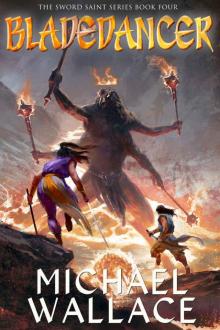 Bladedancer
Bladedancer Sword Saint
Sword Saint The Alliance Trilogy
The Alliance Trilogy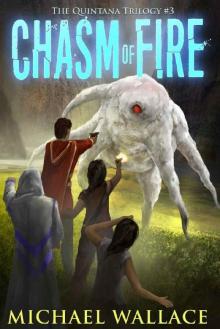 Chasm of Fire
Chasm of Fire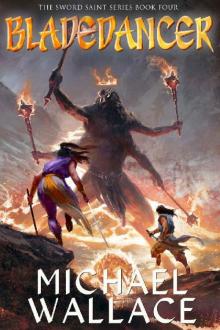 Bladedancer (The Sword Saint Series Book 4)
Bladedancer (The Sword Saint Series Book 4)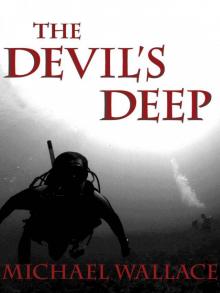 The Devil's Deep
The Devil's Deep Shadow Walker (The Sword Saint Series Book 3)
Shadow Walker (The Sword Saint Series Book 3)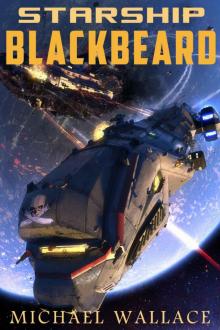 Starship Blackbeard
Starship Blackbeard The McHenry Inheritance (Quill Gordon Mystery Book 1)
The McHenry Inheritance (Quill Gordon Mystery Book 1)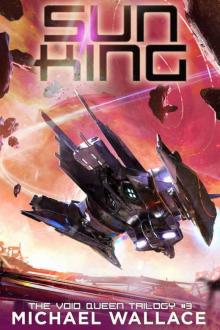 Sun King (The Void Queen Trilogy Book 3)
Sun King (The Void Queen Trilogy Book 3)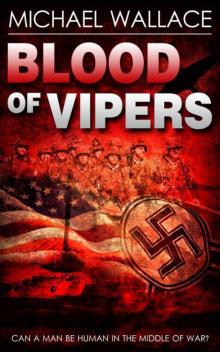 Blood of Vipers
Blood of Vipers Righteous - 01 - The Righteous
Righteous - 01 - The Righteous I Scarce Can Die (Quill Gordon Mystery Book 5)
I Scarce Can Die (Quill Gordon Mystery Book 5) The Devil's Cauldron
The Devil's Cauldron The Wicked (The Righteous)
The Wicked (The Righteous) Crow Hollow
Crow Hollow Righteous03 - The Wicked
Righteous03 - The Wicked Righteous02 - Mighty and Strong
Righteous02 - Mighty and Strong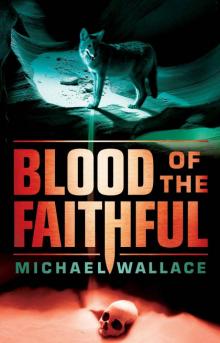 Blood of the Faithful
Blood of the Faithful Wash Her Guilt Away (Quill Gordon Mystery Book 2)
Wash Her Guilt Away (Quill Gordon Mystery Book 2) The Kingdom of the Bears
The Kingdom of the Bears The Emerald Crown (The Red Sword Trilogy Book 3)
The Emerald Crown (The Red Sword Trilogy Book 3)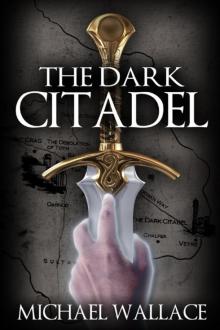 The Dark Citadel
The Dark Citadel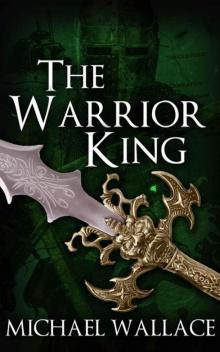 The Warrior King (Book 4)
The Warrior King (Book 4)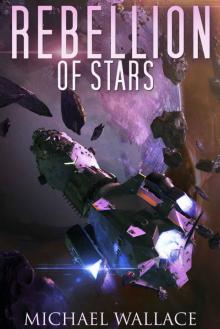 Rebellion of Stars (Starship Blackbeard Book 4)
Rebellion of Stars (Starship Blackbeard Book 4) Righteous04 - The Blessed and the Damned
Righteous04 - The Blessed and the Damned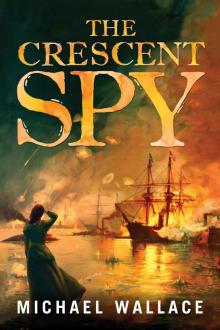 The Crescent Spy
The Crescent Spy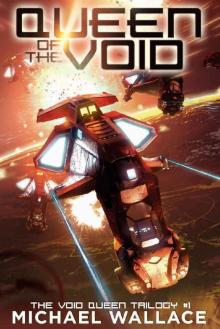 Queen of the Void (The Void Queen Trilogy Book 1)
Queen of the Void (The Void Queen Trilogy Book 1)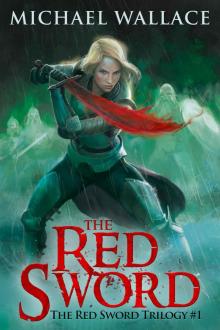 The Red Sword (The Red Sword Trilogy Book 1)
The Red Sword (The Red Sword Trilogy Book 1)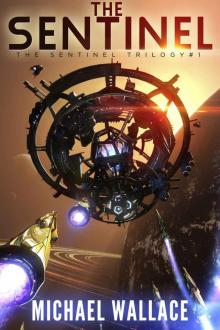 The Sentinel (The Sentinel Trilogy Book 1)
The Sentinel (The Sentinel Trilogy Book 1) The Golden Griffin (Book 3)
The Golden Griffin (Book 3) The Blessed and the Damned (Righteous Series #4)
The Blessed and the Damned (Righteous Series #4) Hell's Fortress
Hell's Fortress Not Death, But Love (Quill Gordon Mystery Book 3)
Not Death, But Love (Quill Gordon Mystery Book 3) Destroying Angel
Destroying Angel The Free Kingdoms (Book 2)
The Free Kingdoms (Book 2)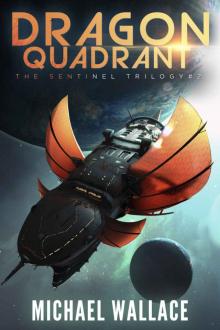 Dragon Quadrant (The Sentinel Trilogy Book 2)
Dragon Quadrant (The Sentinel Trilogy Book 2)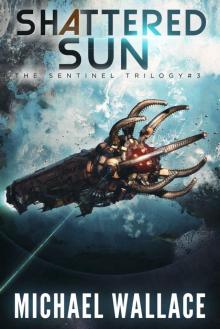 Shattered Sun (The Sentinel Trilogy Book 3)
Shattered Sun (The Sentinel Trilogy Book 3) The Wolves of Paris
The Wolves of Paris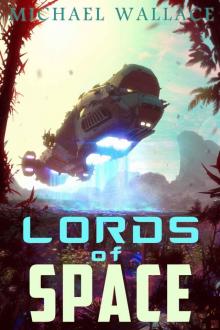 Lords of Space (Starship Blackbeard Book 2)
Lords of Space (Starship Blackbeard Book 2)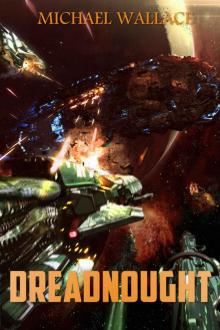 Dreadnought (Starship Blackbeard Book 3)
Dreadnought (Starship Blackbeard Book 3) The Village of Dead Souls: A Zombie Novel
The Village of Dead Souls: A Zombie Novel The Black Shield (The Red Sword Book 2)
The Black Shield (The Red Sword Book 2) The Daughters Of Alta Mira (Quill Gordon Mystery Book 4)
The Daughters Of Alta Mira (Quill Gordon Mystery Book 4) Mighty and Strong (The Righteous)
Mighty and Strong (The Righteous)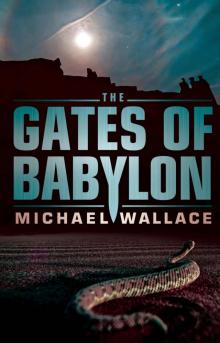 The Gates of Babylon
The Gates of Babylon